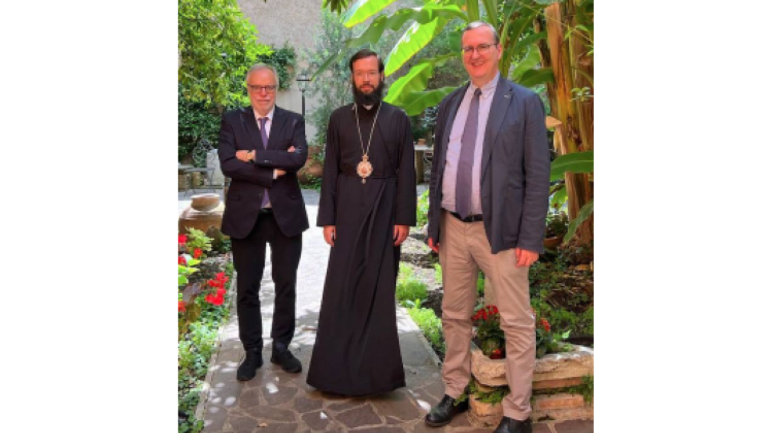And They Call It Peace. The Plans of Sant’Egidio for Ending the War in Ukraine, to the Acclaim of Moscow

A few days later Roccucci, who teaches contemporary history at Roma Tre University and is a specialist on Russia, would accompany Cardinal Matteo Maria Zuppi, also a historical member of Sant’Egidio, on his mission to Moscow as the pope’s envoy. And both, on June 29, would take part in the meeting with Moscow patriarch Kirill, beside whom sat Metropolitan Anthony.
It is not surprising, therefore, that in a lengthy press release issued by the Moscow Patriarchate at the end of the meeting there should be found not only the names of all the participants – kept confidential until then by the Vatican authorities – but also Kirill’s explicit praise of the “positive role of the Community of Sant’Egidio,” not only “in the very difficult circumstances linked to the Cold War,” when “it maintained active ties with the Russian Orthodox Church,” but also “in the current conditions,” so that “the Churches may, with joint efforts, prevent the negative development of political circumstances and serve the cause of peace and justice.”
Spoken by one who, like Kirill, has repeatedly “dared to legitimize the brutal and absurd war on Ukraine with pseudo-religious reasons” – words of Cardinal Kurt Koch, president of the pontifical council for Christian unity – this invocation of peace is dumbfounding.
What kind of peace, in fact, does the patriarch of Moscow have in mind? And what kind of peace motivates the activities, to Moscow’s acclaim, of the community of Sant’Egidio?
Back in Italy, Zuppi said that “we do not yet have a plan that could make a contribution to the opening of a negotiation.”
Meanwhile, however, he has always been vague regarding the armed support that the West has given to Ukraine.
But decidedly against this support right from the start have been not only the newspaper “Avvenire,” owned by the Italian episcopal conference of which Zuppi is president, but also all the prominent representatives of the Community of Sant’Egidio, from founder Andrea Riccardi – who during the early days of the attack even called for the status of “open city” for Kyiv, meaning Russian seizure of control of the Ukrainian capital without resistance – to Agostino Giovagnoli, to Mario Giro.
Mario Giro, head of international relations for the Community of Sant’Egidio and Italian undersecretary and then deputy minister of foreign affairs from 2013 to 2018, is the author of an editorial published on July 1 in the newspaper “Domani” that is the “summa” of the position of Sant’Egidio on the war in Ukraine.
In the mission of Cardinal Zuppi to Moscow, Giro sees a meritorious “going against the tide, that is, against the solely bellicose statements” of which the West is prisoner, but which the rest of the world can no longer bear. And he means to say the “Global South,” in Africa, Asia, Latin America. That south of the world whose aversion to the United States and Europe is also quite present in the Argentine roots of pope Jorge Mario Bergoglio, as highlighted by Sviatoslav Shevchuk, major archbishop of the Ukrainian Greek Catholic Church, in a memorable interview published by Settimo Cielo.
To this vision, which is not only Giro’s but that of the community of Sant’Egidio, of Cardinal Zuppi, and to a large extent of the Church of Rome, here is a reply from Sergio Belardinelli, professor of the sociology of cultural processes at the University of Bologna and from 2008 to 2012 the scholarly coordinator of the “Committee for the Cultural Project” presided over by Cardinal Camillo Ruini.
This commentary of his is coming out simultaneously on Settimo Cielo and in the newspaper “Il Foglio.”
*
A PRETEXT FOR DIVISION BETWEEN PACIFISTS AND WARMONGERS
by Sergio Belardinelli
This war is wearing us out. Not only because it is anything but certain that the Ukrainians will continue to withstand or even succeed in driving back the Russians from the borders of their land. But above all because, in the name of peace negotiations that Europe should establish instead of providing military aid to Ukraine, we are pointlessly scourging ourselves, losing sight of reality.
In an article in “Domani” of July 1, Mario Giro wrote that we have got used to the war, that we are unable to go beyond the bellicose rhetoric, while the world is now looking at us with growing disgust. But what does this mean? If there is anyone who has a lot to lose in this war it is precisely we Europeans: it is a war in our household, it is threatening our well-being, it is making our economies go haywire, it is dividing our public opinion. And would we be so foolish as to continue providing military aid to Ukraine, if only there were another way? Would we be so criminal as to prefer war to peace?
To me these seem like surreal questions. We are in this situation because a gentleman named Vladimir Putin has decided to invade another sovereign country very close to us, which is called Ukraine. We are in this situation because, contrary to what many expected, the Ukrainians have decided to fight, to be massacred, just so as not to give in to the invading Russians. Should we blame them? Should we advise them to surrender? Would we have been better pleased by a quick capitulation on their part? Or, given that at bottom they are also fighting for us, is it the least we can do to continue to help them?
According to Giro, in this way Europe and the West risk isolating themselves from the rest of the world, which would like something else instead. But what would it like, pray tell? That Putin be given what he wants? Or would it perhaps make more sense, even for the rest of the world, to hope that Putin hasn’t won? Moreover, I repeat, those dying in this war are above all the Ukrainians. Would it be more dignified to abandon them to their fate?
Here it is not a question of geopolitics steered by this or that great power, of unipolarity, multipolarity or anything else. What is at stake is a tragedy that cannot be remedied because the one who triggered it does not want to hear about it. Has there perhaps been a real, concrete initiative for peace by anyone, to which Europe and the United States have said no? Has someone in Moscow perhaps given sign of heeding the pope’s prayers?
The problem, I repeat, is that the Ukrainians, at least up to now, prefer to be killed just so as not to give in to Russian domineering. If tomorrow Putin were to decide on a cease fire, a negotiation would start immediately. He started it and he can end this war. We can only suffer it, oppose it with the (few) weapons we have, hoping to do as little harm as possible. Does this mean, as Mario Giro has written, wanting to remain “closed off in one’s own reasons”? Absolutely not, since it absolutely does not depend on our will. We can only console ourselves with the fact that they are good reasons and hope that someone (especially the Ukrainians) will continue to defend them without succumbing. Nor do I believe that the countries of the so-called Global South are making themselves look good by not taking sides simply because in this way they give a slap to the United States. The slap they give is to the Ukrainians, for a fact! For whom all this is just chatter, perhaps inspired by good intentions, but chatter.
Having said that, I hope that Cardinal Matteo Zuppi has gone to Moscow, not to be a “nonconformist,” but to ask Patriarch Kirill to put pressure on Putin that he return to their Ukrainian mothers the children that his soldiers have kidnapped, and withdraw his troops from Ukraine. What else could he have asked of him, other than that the conditions be put in place for the Russians and Ukrainians to sit down at a table and negotiate peace?
But this is exactly what all Europeans want; it cannot become a pretext for division between pacifists and warmongers. Otherwise for some, especially in Ukraine, the suspicion might arise that many of those who say they want peace hope in reality that the war will end as soon as possible with the defeat of Ukraine, and cannot wait to be acclaimed by Moscow, Beijing and that whole beautiful world that revolves around them, as the true peacemakers.









